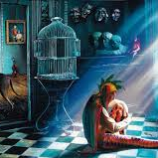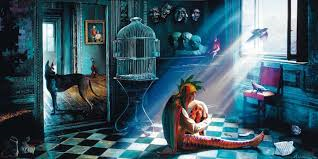The second abstract core of the sorcery stories is called the knock of the spirit. The first core, the manifestations of the spirit, is the edifice that intent builds and places before a sorcerer, then invites him to enter. It is the edifice of intent seen by a sorcerer. The knock of the spirit is the same edifice seen by the beginner who is invited–or rather forced–to enter.
This second abstract core could be a story in itself. The story goes that after the spirit had manifested itself to that man we have talked about and had gotten no response, the spirit laid a trap for the man. It was a final subterfuge, not because the man was special, but because the incomprehensible chain of events of the spirit made that man available at the very moment that the spirit knocked on the door.
It goes without saying that whatever the spirit revealed to that man made no sense to him. In fact, it went against everything the man knew, everything he was. The man, of course, refused on the spot, and in no uncertain terms, to have anything to do with the spirit. He wasn’t going to fall for such preposterous nonsense. He knew better. The result was a total stalemate.
I can say that this is an idiotic story and that what I’ve given you is the pacifier for those who are uncomfortable with the silence of the abstract.
After a lifetime of practice, sorcerers know if the spirit is inviting them to enter the edifice being flaunted before them. They have learned to discipline their connecting links to intent. So they are always forewarned, always know what the spirit has in store for them.
Destiny and meaning of life
Progress along the sorcerers’ path was, in general, a drastic process the purpose of which was to bring this connecting link to order. The average man’s connecting link with intent is practically dead,
and sorcerers begin with a link that is useless, because it does not respond voluntarily. In order to revive that link sorcerers needed a rigorous, fierce purpose – a special state of mind called unbending intent. Accepting that the master is the only being capable of supplying unbending intent is the most difficult part of the sorcerer’s apprenticeship.
The task of sorcery, from the spirit’s point of view, consists in striving to clear and revive his connecting link with the spirit. The edifice that intent flaunts before us is, then, a clearinghouse, within which we find not so much the procedures to clear our connecting link as the silent knowledge that allows the clearing process to take place. Without that silent knowledge no process could work, and all we would have would be an indefinite sense of needing something.
The events unleashed by sorcerers as a result of
silent knowledge were so simple and yet so abstract that sorcerers had decided long ago to speak of those events only in symbolic terms. The manifestations and the knock of the spirit were examples.
Each of us was barred from silent knowledge by natural barriers, specific to each individual. We, as average men did not know, nor would we ever know, that it was something utterly real and functional – our connecting link with intent – which gave us our hereditary preoccupation with fate. He asserted that during our active lives we never have the chance to go beyond the level of mere preoccupation, because since time immemorial the lull of daily affairs has made us drowsy. It is only when our lives are nearly over that our hereditary preoccupation with fate begins to take on a different character.
It begins to make us see through the fog of daily affairs. Unfortunately, this awakening always comes hand in hand with loss of energy caused by aging,
when we have no more strength left to turn our preoccupation into a pragmatic and positive discovery. At this point, all there is left is an amorphous, piercing anguish, a longing for something indescribable, and simple anger at having missed out.
Related Articles














